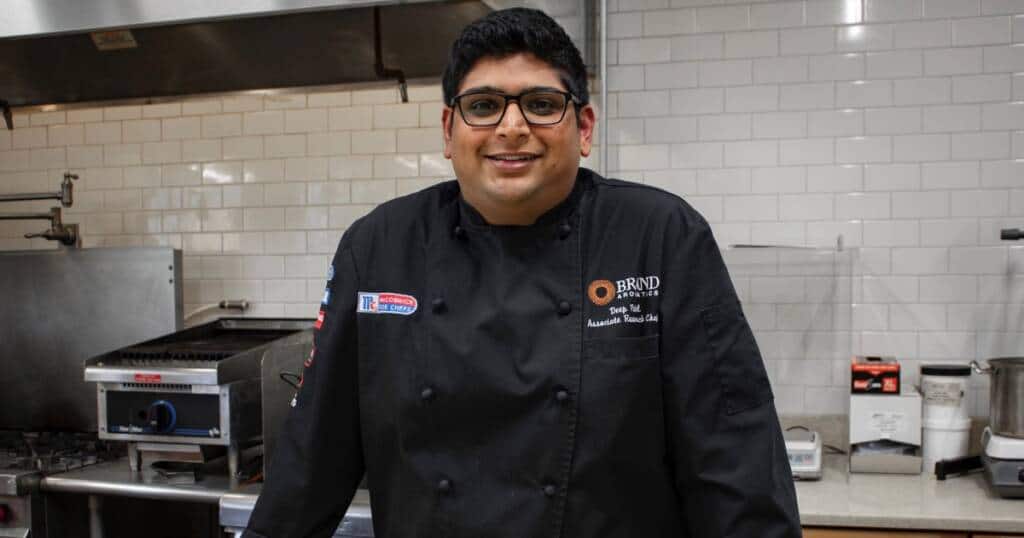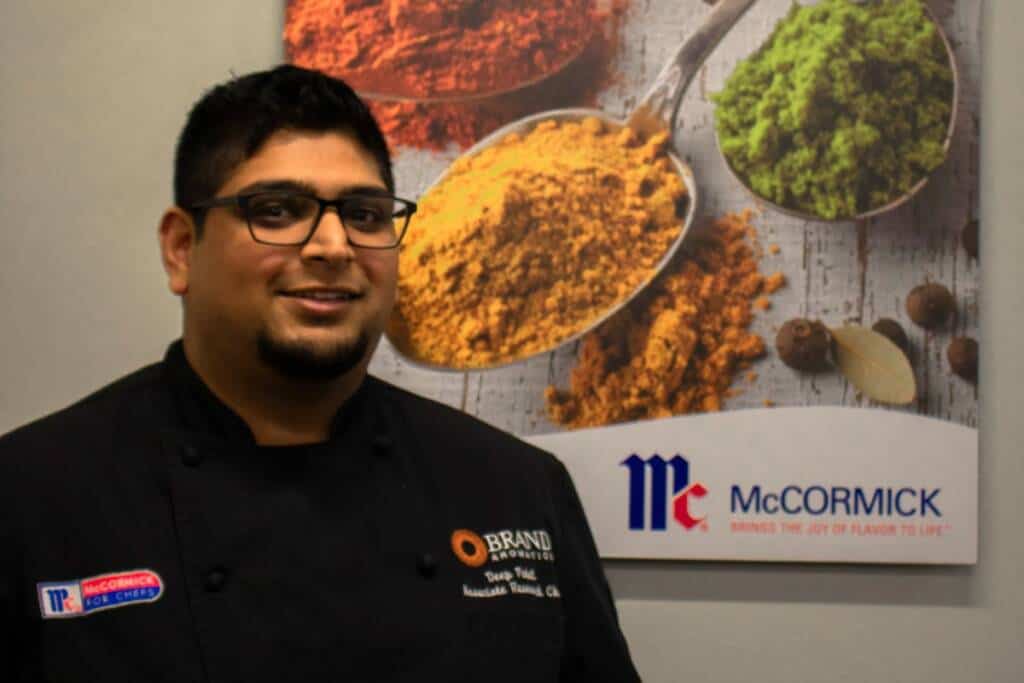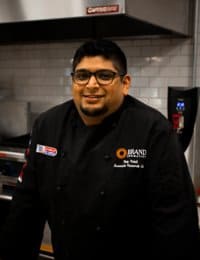
“I would tell them that, though it may be intimidating, they should take the leap. You won’t be sorry! The CIA provides the best culinary education you can get.”
CIA Alumni Bio
As associate research and development chef at McCormick & Company, Deep Patel calls upon the knowledge and skills he gained in the CIA’s culinary science program every day. Here he shares his experiences pre-CIA, during his time in both the associate and bachelor’s degree programs, and in the industry after his 2017 graduation.

How did you come to the realization that your life would be in the food world?
I came from a family that instilled in me at a very young age the value of sharing a meal with the people you love. Quite often for all the major holidays, the children would make dinner as a gift to aunts, uncles, and grandparents. Being the youngest, I was always put on garlic bread duty and from that on, my love for cooking grew. But I didn’t realize I could make it into a career until my second year of college when I became extremely unhappy with what I was doing with my life. It took something as simple as watching a Bollywood movie called 3 Idiots to change my life around.
Why did you choose the CIA?
This is a very big cliché, but I quite literally just Googled “best culinary schools in the world.” I was living in Atlantic City at the time working as a dishwasher and prep cook, and I took the drive up to the New York campus. I fell in love with the beauty of the Hudson Valley; I had never seen such breathtaking views. I also noticed how disciplined the students were as I was watched them yell back orders and “Oui Chef” in the high-production kitchen followed by dead silence as the team focused on the task at hand. I knew that was what I wanted to be a part of.
How did the CIA prepare you for your chosen career?
My time at the CIA taught me to have respect for your team, your ingredients, and your guest. I learned the true meaning of professionalism. I also learned to question everything and when you get a run-around answer, just figure it out. Excuses are just words; you need actions to make it happen.
How did scholarships and/or grants help you reach your goal of getting a CIA education?
I was fortunate enough to receive multiple grants and scholarships throughout my years at CIA. That extra money not only allowed me to stress less about how much money I will owe after I finish school, it also allowed me to make the most of my time in the Hudson Valley. There is so much to do, see, and explore—and financial aid helped me do that.
What did you like best about your CIA experience?
The relationships! For the first time in my life, I felt like I found a place where I belonged. I was surrounded by people who love the same things I do and are able to understand me for who I am. CIA forces you to work with people outside of your comfort zone and that is the push I needed to grow. I didn’t just have friends at school, I had a family—and two years later, I’m still able to call them my family.

What is the best lesson you’ve learned while at the CIA?
Stay humble and continue to learn! No matter what the title on your coat says, there is always room for more learning. When creating a menu and developing flavors, there are thousands of different cuisines and so many different possibilities—you never know what you might learn next.
What class at the CIA had the most impact on you?
Culinary Fundamentals—I was fortunate enough to have Chef Xavier LeRoux who tried to instill the French culinary discipline in his students, and Chef Dominick Cerrone, who not only explained the theory of the class but took the time to explain the science behind the techniques we used and why they worked. “Fundies” was the first pillar that built my love for culinary science.
What really cool stuff did you do in culinary science class?
I think the days that we hold open houses were cool because our teams created some really cool dishes. One of the teams did a carbonated encapsulated mojito; another did a hot and cold Arnold Palmer. I also found learning about distilling flavors using the rotary evaporator was mind-blowing. A lot of the labs in Ingredient Functionality were extremely fun, different, and cool. They were simple labs but we were able to create dishes that had been blowing people’s minds for decades such as the popping olive made famous by Ferran Adrià.
What’s your favorite part of your job?
I am able to be creative and get to develop global flavors. I also have the opportunity to implement scientific techniques with classic global flavors.
How do the skills and knowledge you gained in the CIA culinary science program help you in your job?
Throughout the cul sci program, it didn’t matter where you wanted to end up in the culinary world because the classes were geared toward everyone. This concept helped me better understand the dynamics of working in a professional setting. I found that the science-based classes in my first semester of culinary science ingrained in me a deeper level of understanding of cooking. The thermodynamics of cooking that we used in our cul sci lab are the same principles I am able to apply when scaling up to thousands of pounds. I also found that our semester-long project that allowed us to take a product through the entire research and development process—from inception to commercialization—exposed us to the terminologies used in these functions early on, which made the concepts easier to understand.
What do CIA culinary science grads bring to the industry that make them really stand out to an organization?
In my opinion, to be the best chef you need to understand what is happening to your food. I found that throughout my time in the program I wasn’t just doing things simply because they were taught to me a certain way, but rather I was able to improve my techniques because I was able to understand what was happening to the product on a molecular level. It seems that cul sci students are able to create this niche for themselves. We aren’t just cooks anymore, we are scientists too—and this blend of understanding is what I see more employers wanting. Students in traditional food science programs are exposed to many of the same concepts as the culinary science student, but the fact that CIA students also understand how to create and combine flavors puts them at an advantage. Dean Ted Russin said it best throughout his class: “You guys have a niche set of skills that none of the other programs have.” I didn’t fully consider what he meant until I was working in the industry.
My manager, who is also a CIA grad, hired a cul sci graduate from the college two years prior and once he saw how cul sci students think, he came back to CIA to hire another graduate from the program—which is what put me one step ahead. At McCormick, I found that because my colleagues were all CIA grads, it made working as a team a lot easier because we were trained in the same way which helped us stay on the same page.
What are some challenges that students may face in the industry?
One challenge I foresee for students is deciding on the job that is right for them. I found out through my time at CIA there are a lot more career paths than just the restaurant industry.
What advice would you give to a new student or someone who is considering attending the CIA?
I would tell them that, though it may be intimidating, they should take the leap. You won’t be sorry! The CIA provides the best culinary education you can get. When you leave with a CIA degree, you are automatically one step above the rest. Then it’s your job to make something of it.
Chef Patel graduated with a bachelor’s degree in culinary science from The Culinary Institute of America in Hyde Park, NY. He is an associate research and development chef at McCormick & Company.